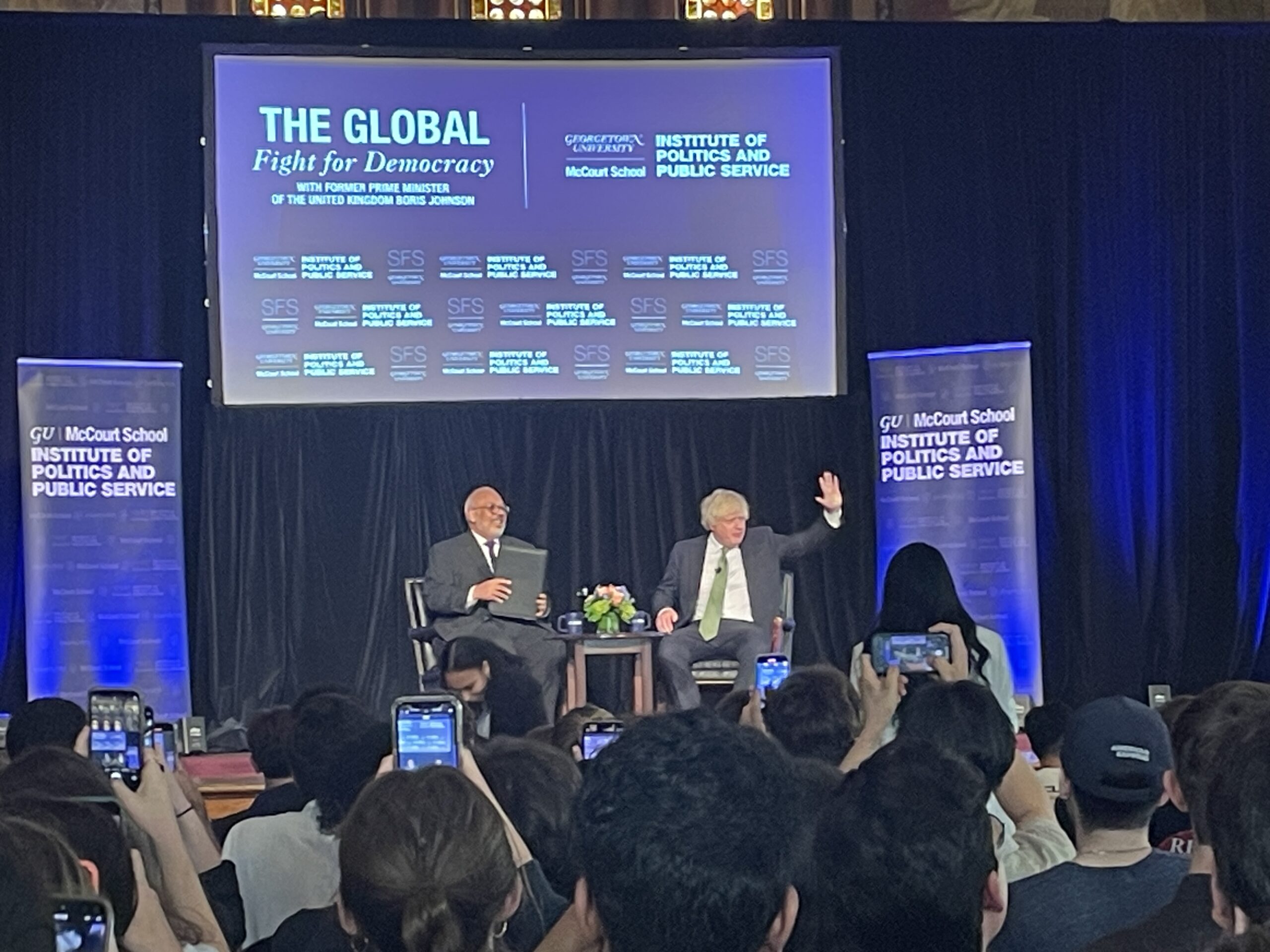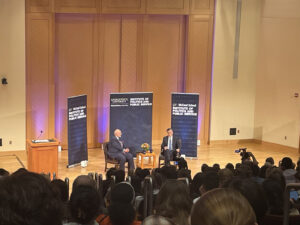Former United Kingdom Prime Minister Boris Johnson spoke to a packed Gaston Hall about the ongoing wars in Ukraine and Gaza, Brexit, and Trump on April 11. The event, titled “The Global Fight for Democracy,” was organized by the McCourt School’s Institute of Politics and Public Service (GU Politics), and was moderated by executive director of GU Politics Mo Elleithee.
Johnson was U.K. prime minister and leader of the U.K. Conservative party, the Tories, from July 2019 until September 2022.
Johnson entered the room to laughs, cheers, and whoops from the audience.
“This is the cream of the cream,” Johnson announced as he sat onstage.
The charismatic and jocular tone continued for much of the remainder of the event, interrupted only when Johnson spoke about Israel’s invasion of Gaza or during moments of confrontation during the student question portion of the event.
Elleithee began by asking Johnson to evaluate the state of democracy worldwide and explain its importance.
“We kind of assume that everyone’s with us and everyone’s in favor of democracy,” Johnson said.
However, he added that, in a time of increasing democratic backsliding, the world’s enthusiasm for fighting against autocracy is waning. Johnson also warned that the loss of democratic institutions often leads to deterioration of other rights.
“In the absence of democracy, you will start to see genuine threats,” he said. “It’s the thing that leads to the greatest prosperity.”
Johnson said that free market capitalism in conjunction with democracy leads to innovation in medicine and the arts.
“The vaccines that actually worked were made in the Western democratic capitalist countries,” he said. “You need that academic freedom, you need that commercial freedom.”
Beyond scientific innovation, Johnson jokingly connected Russian autocracy to its relative lack of globally popular music.
“Who listens to the music from the autocracies?” he asked the audience. “No one queues up to listen to Russian techno-funk.”
The discussion soon moved onto the wars in Ukraine and Gaza. Johnson said that the reason why Ukraine has lasted so long in the war is a combination of Ukrainian bravery and Western support.
“I think the Ukrainians will win, but they can only win with intensified Western support,” he said.
On Gaza, Johnson briefly acknowledged the civilian harm caused by Israeli attacks, calling for a rapid end to the war. But he soon moved on to express support for Israel and a critique of the pro-Palestine movement, expressing disagreement over pro-Palestine protests that took place shortly after Hamas’ Oct. 7 attacks, which killed about 1,200 Israelis.
“We’ve got to maintain that moral clarity about what happened. And the difference between Hamas and Israel is that Hamas set out to maim, murder, rape, and kill innocent people, as many as they could, and this was instigated by the leadership of Hamas from Gaza. And I think Israel had no choice but to make sure that never happened again,” Johnson said.
Since Oct. 7, the Israel Defense Forces (IDF) have killed over 33,000 Palestinians, including 13,800 children, in the country’s war on Gaza. Israel’s actions in the ongoing invasion and bombardment have been deemed by U.N’s International Court of Justice as plausibly violating the Genocide Convention.
Johnson went on to equate ending arms sales to Israel to supporting Hamas.
“If the U.K. or the U.S. bans arms to Israel, saying, ‘We must leave the war,’ logically, we’re urging everyone to ban arms to Israel,” Johnson said. “We’re logically saying that we think Hamas should win.”
He condemned some of Israel’s actions, such as the IDF’s killing of seven World Central Kitchen aid workers, which he called “reprehensible.” Yet, went on to defend what he perceives as Israel’s efforts to limit casualties.
“As far as I can tell, there is a huge amount of pressure on Israel to try to minimize civilian casualties,” he said. “Whereas with Hamas there is—I’d say the motive is the other way around. They want to maximize civilian casualties. And as far as I can see, they actually want to maximize their own. They’re allowing huge numbers of their own people to be killed by provoking Israel to do what it’s doing. Because they know it is so corrosive of Western support for Israel.”
As the conversation shifted from global wars to U.K. politics, Johnson defended his role in Brexit. A prominent advocate for the Brexit campaign, Johnson oversaw his country’s exit from the European Union in January 2020. Johnson at one point compared the movement to the American revolution, framing Brexit as a struggle for British independence.
“Any person in the United States of America who says they don’t understand what Brexit is all about—I mean, you broke away from the United Kingdom. You decided that you weren’t going to be governed without proper representation from a viking overseas,” he said. “And for exactly the same reason, the people of the United Kingdom didn’t want to be endlessly locked into something which was trying to create a single political entity and eroding their democratic freedoms.”
He said that the European Union hadn’t been as responsive to the U.K. as he would have liked, and that the U.K.’s non-EU status expedited the COVID-19 vaccine rollout in the country.
“Democracy—the ability to run your own country—is absolutely fundamental, and that’s what Brexit was all about,” he said.
In response to student questions about Brexit and his record as prime minister, including one about polls showing popular regret about the Brexit decision, Johnson repeatedly circled back to what he viewed as a successful vaccine rollout arguing that the positive effects of Brexit would take more time to become evident.
The event ended with a question about whether Johnson would run for office again, which he said would be “unlikely in the short term.”
“I think the only circumstances on which anybody should stand for elections [is] if they really think they have something useful to contribute. And if I did think that, I think I would,” he said.






